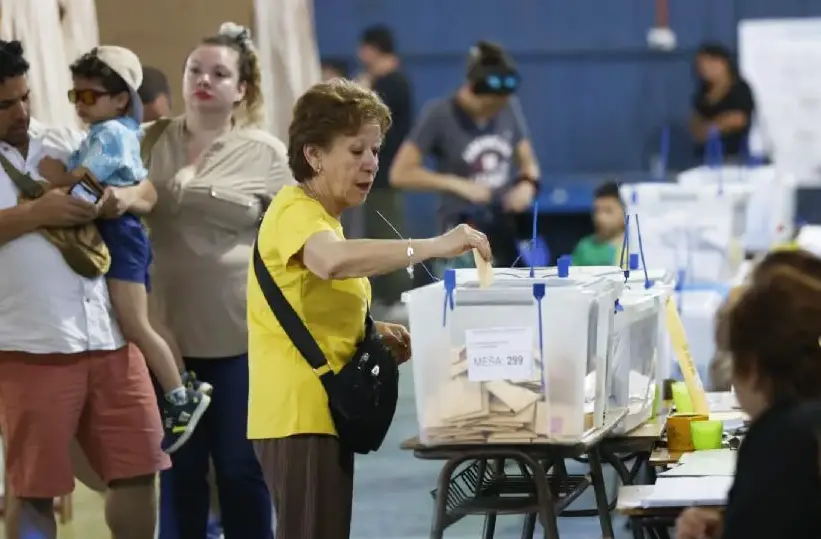If there is something that characterizes Uruguayan democracy, it is its harmony, almost as a reflection of its own geography. Uruguay is, in short, a prairie in every sense. Even when the political sign varies, governments do not aim at radicalism and, for the moment, the country seems to be more or less shielded against disruptive figures that seek clashes rather than coexistence. Uruguay is a sui generis case, yes, but it is not exempt from criticism and particularities.
Last Sunday, October 27, Uruguayan citizens once again went to the polls in a national election. After failing to reach the 50% + 1 required to win in the first round, the presidency of the Republic continues to be disputed between the candidate of the Broad Front, Yamandú Orsi, and that of the National Party, Álvaro Delgado. Thus, the country still has a couple of weeks left on the way to the ballot which will take place next November 24.
Orsi leads the leftist coalition that, for the fifth consecutive time, is positioned as the most voted political force, reaching 43.9% of the votes, while Delgado aspires to turn his 26.7% into a majority, betting on renewing the center-right coalition that allowed Luis Lacalle Pou to access to power in 2019 and that is integrated, in addition to the National, by the Colorado, Cabildo Abierto and Independent parties.
However, the scenario cannot be elucidated so easily. Based on a linear sum of votes, the coalition does exceed the percentage of the left, but it also means underestimating the decisions of the electorate.
The same night of the elections, the strategies of the presidential candidates began to take shape, with Orsi betting on national unity and Delgado insisting on giving continuity to the coalitionist political project, as well as recognizing Lacalle Pou’s leadership. The message received by the citizenry from the candidates was different, both in terms of discourse and presentation: Orsi embracing his running mate, Carolina Cosse, giving her the floor first and a Delgado seeking to present himself as the leader, acknowledging, first, the coalition partners, then the National Party and, finally, his running mate, Valeria Ripoll.
In a way, these nuances are a reflection of the priorities when it comes to building a government. Being the opposition allowed the Broad Front to learn from its mistakes, starting with the composition of its presidential ticket. Putting Cosse as its second is to recognize a figure of great relevance at the political level and, in a way, to settle the debt of 2019. On the contrary, the National Party generated internal dissent when Delgado chose Ripoll, a newcomer with a union past and left-wing militancy. The candidate bet on a figure who was capable of being absolutely critical of the Broad Front, even if she earned the disenchantment of its militants.
Governance yes, governance no: the conformation of the Parliament
Something that continues to be difficult in Uruguay is the issue of parity in electoral positions. 92 years after the approval of women’s suffrage, this is only the second election where the vice presidency will be held by a woman (not counting Lucía Topolansky, who acceded to the position due to the resignation of the incumbent, Raúl Sendic, in 2017). Unlike the current incumbent, Beatriz Argimón, who has held positions in the legislature since 2000, the new aspirants to the position have little or no experience at the parliamentary level.
However, the legislative backing of both is totally different. Cosse seems to have some advantages to leading the Senate, since the Broad Front obtained the majority in that Chamber with 16 seats out of 30, against the 9 of the National Party and the 5 of the Colorado Party. On the contrary, Ripoll will start with a minority of both his party and the “multicolor coalition”, as well as with possible complications in the coexistence given his own political history.
Regarding the trajectory of the elected Senators, 26 of the 30 incumbent Senators have experience at the legislative level, being the newcomers figures of great notoriety: Andres Ojeda and Robert Silva (who until Sunday were the presidential ticket of the Colorado Party), Carolina Cosse herself (who was elected Senator in the previous term but left her position to assume as municipal chief of Montevideo) and the mythical journalist reconverted into politician, Blanca Rodriguez (referred to in the jargon as “José Mujica’s last move” to recover part of the lost electorate). While this also reflects Uruguay’s democratic tradition and the quasi-impossibility of outsiders breaking into politics, the legislature is not entirely safe.
The House of Representatives is composed of 99 seats, 48 for the Broad Front, 49 for the Republican Coalition, the other two seats being for Sovereign Identity. The latter seems to be the great novelty, a party founded in 2022 and whose leader —and elected deputy— Gustavo Salle has gained notoriety for his peculiar way of campaigning with a megaphone and an “anti-system” discourse: contrary to the 2030 agenda and opposed to rights conquered in the progressive era such as the decriminalization of abortion, the gender-based violence law and the irrigation law, among others. In his first appearance after the results, Salle said that his party entered “the cave of the traitors”. Although he later affirmed that he will moderate his speech, Salle, more than a picturesque figure, is a warning regarding extremist positions that could affect governance.
Uruguay has yet to choose who will lead the Executive, but beyond the fact that it may opt for continuity or bet on change, the big game will be in the Legislative Palace, whose power and capability should never be underestimated. In a government that will take office in 2025, 40 years after the restoration of democracy, the legislative power will be the scenario of consensus and disagreements. It is there that the focus should be placed.
*Translated by Janaína Ruviaro da Silva from the original in Spanish.












